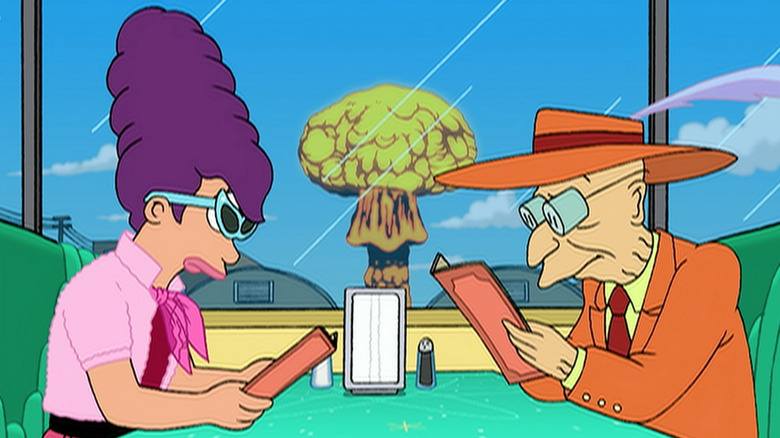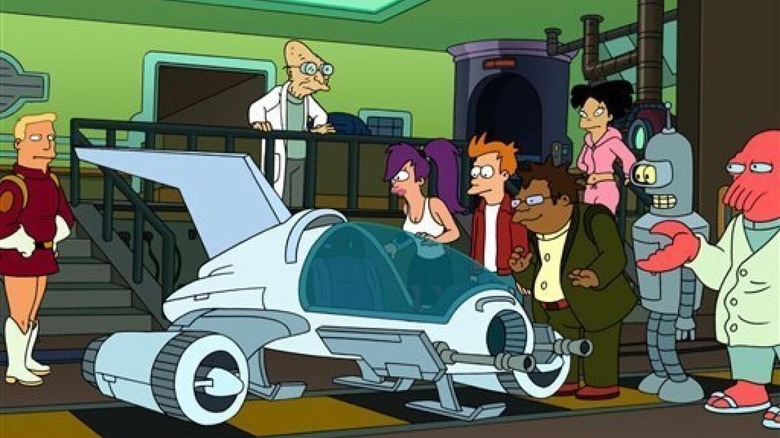How Futurama Gets Away With Scientific 'Mistakes'
Although "Futurama" is filled with some of the best science and math jokes in animated comedy, it is still very much a show where humor trumps realism. "Futurama" expects its audience to understand the time travel rule that accidentally killing a young version of your grandfather will create a paradox, only to resolve the paradox with the nonsensical (but very funny) punchline of Fry accidentally becoming his grandfather, which doesn't quite make sense from a genetic point of view. It similarly expects its audience to understand how compound interest works for a joke about Fry's 93 cents in 1999 turning into $4.3 billion in 2999, yet conveniently sidesteps any questions about inflation.
This all comes down to a central rule in the show's writers' room, one that was apparently written on a whiteboard: "Science Shall Not Overrule Comedy." As co-creator David X. Cohen explained in a 2013 interview, "We wanted as much as possible to honor real comedy and show that we knew what we were making fun of, but when push came to shove, make sure that the show was funny, and not a dry lecture."
It's an approach that a lot of sci-fi viewers and readers can probably appreciate. There's nothing worse than when a show/movie/novel suddenly takes a break from the fun characters and storylines to give us an exposition dump that feels like you're reading a textbook. There's a reason why everyone loves "Jurassic Park" the movie, not the book. Most viewers don't need the specifics of the science behind what's happening; usually, they just need to know the gist.
Throwing in a few winks
But while "Futurama" never gets too high art to confuse the regular people in the audience, it's always been pretty good at tipping its hat to the physicists watching at home, letting them know that the show is also aware of how nonsensical most of this is. As Cohen explained:
"Whenever we violated the laws of physics — for example, when the ship goes faster than the speed of light — we always tried to indicate to viewers that, even though we're violating science, we understand what it is we're violating. For example, we did an episode where we explained that, no, they're not going faster than the speed of light; science had readjusted the speed of light in the year 2999, or whenever."
It's a ridiculous explanation, but of course, it's no more ridiculous than a robot main character who is inexplicably more emotional and self-centered than any regular human. It's the sort of thing that's funny to casual viewers, while pre-emptively addressing the complaints of any nitpicky members of the audience. "We always try to tip the fans off that we're not violating science out of ignorance," Cohen said. And for the most part, viewers over the past few decades have been more than happy to accept the occasional scientific inaccuracy in their sci-fi comedy cartoon.
Not violating science for the sake of it, either
While "Futurama" has fun ignoring scientific rules as the plot requires, it still puts in the work with most of its science, math, and even language-related humor. When there's a joke involving binary code, the numbers always check out. When the show introduced another language called "Alienese" in its second episode, its writers made sure every sign in that language was consistent and could be decoded by hardcore fans.
It's a high-effort show in this regard, which is made perhaps most clear in the 2010 episode "The Prisoner of Benda," where the Planet Express crew needed a way to get everyone's brains back in their correct body without being able to simply reverse a swap between the same two people. The math behind such a procedure is more complicated than you'd think, but luckily the show had three PhDs in the writers' room ("Ken Keeler, Jeff Westbrook, and Bill Odenkirk," Cohen said) who could figure it out.
"Ken proved the theorem, which we actually flashed onscreen, for one second, so as not to distract the people who weren't interested, but to show the people who were interested what was going on," Cohen explained. It wasn't just an impressive moment; it also cemented just how capable the Harlem Globetrotters who solved the equation in the episode really were. It also didn't hurt that it allowed the show to gloss over the many other scientific problems that come with taking brains out of people's bodies.
After season 11 favored contemporary social comedy at the expense of science fiction storylines, we're hoping the next couple of seasons get back to the science. Whether it's cheekily ignoring scientific rules or sticking to them to an impressive degree, a science-focused "Futurama" is always a lot of fun.


